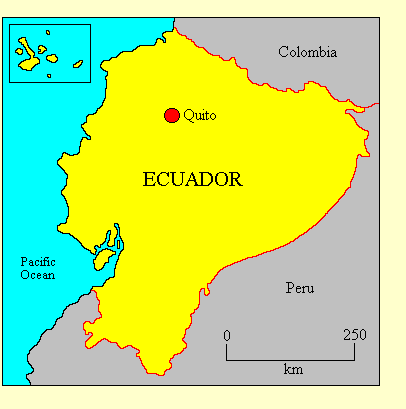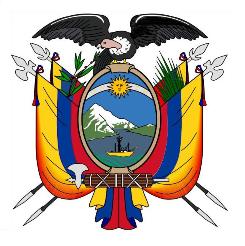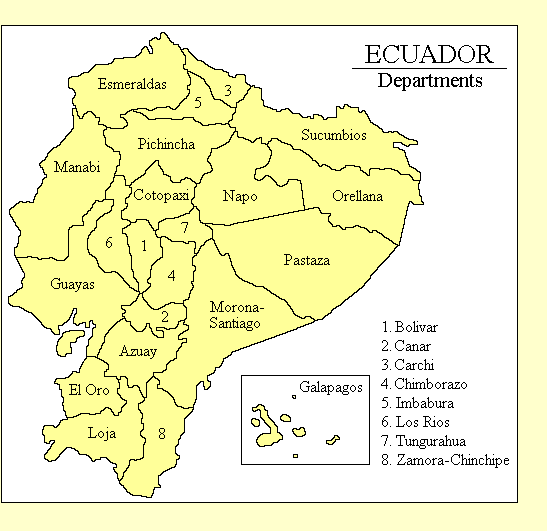

REPUBLIC OF ECUADOR
• Official name: Republica del Ecuador (Republic of Ecuador)
• Location: South America
• International organisations: Andean Community, Non-Aligned Movement, Organisation of American States,
United Nations, World Trade Organisation
• Borders: Colombia, Peru
• Coastline: Pacific Ocean
• Land area: 283,560 Km2 (this is the area currently under Ecuadorian administration.
Ecuador claims a large part of northern Peru.)
• Population: 13,600,000
• Annual GDP (PPP) per capita: US$7,400 (2009 CIA estimate). World ranking: 98
• Ethnicity: Mestizo (mixed Amerindian and white) 65%, Amerindian 25%,
Spanish and other European descent 7%, African 3%.
• Languages: Spanish is the official language and is widely understood. Quechua and
other Amerindian languages are used in remote areas.
• Religion: Over 95% are at least nominally Catholic Christians.
• Form of government: Presidential democratic republic. Ecuador is divided into 22 provinces.
• Capital: Quito (strictly speaking San Francisco de Quito)
• Constitution: The new Constitution of the Republic of Ecuador came into
effect on 10 August 1998.
• Head of state: The President, elected by direct universal suffrage for a four-year term.
• Head of government: The President, who appoints the Cabinet.

• Legislature: Ecuador has a unicameral legislature, the National Congress
(Congreso Nacional), which has 124 members elected for four-year terms by proportional representation
from national and provincial lists.
• Electoral authority: The National Elections Council administers national elections.
• Freedom House 2009 rating: Political Rights 3, Civil Liberties 3
Political history
The area which is now Ecuador was brought under Spanish control in the mid 16th
century. In Spanish times it was usually administered either from Lima or Bogota. Rebellion
against Spanish rule began in 1810 and ended with the battle of Pichincha in 1822.
Ecuador then became part of the Republic of Gran Colombia, but seceded in 1830.
For most of its history Ecuador has been ruled by a small landowning oligarchy. It
has suffered unstable government, with frequent coups and long periods of dictatorship.
Ecuador was dominated for 40 years by Jose Maria Velasco Ibarra, a conservative
who was president or dictator five times between 1934 and 1972. Between 1972 and 1978
there was a military regime, but in 1978 constitutional government was restored.
President Abdala Bucaram Ortiz, elected in 1996, was impeached for incompetence
in 1997, leading to a prolonged political crisis. Jamil Mahuad was elected president in 1998, but
in January 2000 Colonel Lucio Gutierrez attempted a coup on a radical platform. The coup
was defeated, but Mahuad resigned and was succeeded by Vice-President Gustavo Noboa, who served
until 2003. Gutierrez was elected President in 2003, promising
a new era of radical reform. His chaotic presidency ended when he was removed by the Congress in
2005. Vice-President Alfredo Palacio served the remainder of the term.

In 2006
Rafael Correa, a "humanist and Christian
of the left," was elected President, on a platform of constitutional reform and action
against poverty. In 2007 Correa won a national referendum to rewrite Ecuador's constitution,
expanding the power of the presidency and state control over the economy. Despite his
high-handed and in some cases illegal acts in forcing through the changes, he was comfortably
re-elected President in 2009.
Ecuador has a weak party system, with most parties being merely vehicles for
presidential candidates. The dominant party is now President Correa's
Proud and Sovereign Fatherland (PAIS), which won the
largest number of seats, though not a majority, at the 2009 legislative election. The main
opposition parties are former President Gutierrez's
January 21 Patriotic Society Party (PSP) and
the Social Christian Party (PSC).
Freedom House's 2009
report on Ecuador
says: "Ecuador is an electoral democracy. However, it suffers from an unstable political system
that has brought it eight presidents since 1996. The 2006 elections, while generally free and fair,
were plagued by technical glitches. Elections to the constituent assembly in 2007 were deemed free
and fair by the European Union, as was the September 2008 constitutional referendum...
Ecuador is racked by corruption. Numerous politicians and functionaries have been investigated for
graft, and the public perceives corruption to be present in nearly every social sphere...
The country was ranked 151 out of 180 countries surveyed in Transparency International's 2008
Corruption Perceptions Index... Constitutional guarantees of freedom of expression are generally
observed, and the media, most of which are privately owned, are outspoken...
The judiciary, broadly undermined by the corruption afflicting all government institutions, remained
in a state of crisis following the political turmoil of 2005 and the struggle between the executive
and legislative branches in 2007."
Updated February 2010
|


